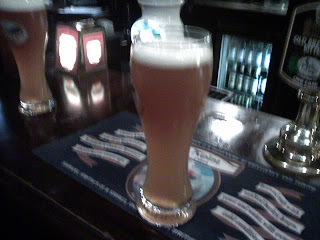Or should that be a pub walk in London as the CAMRA guidebook rather coyly puts it? Either way I got totally plastered last night.
Me and the lovely Lisa met up with her siblings and partners at
the Blackfriars. They had the excellent
Timothy Taylors Landlord on and it was delicious. This was the start of my downfall as I'm pretty sure I necked four pints whilst waiting for people to arrive. I must try and remember in future that drinking four pints in the first stop on a pub crawl is not a good idea.
 The Blackfriar's amazing interior
The Blackfriar's amazing interior
Next stop was
Ye Olde Cheshire Cheese. As it's a Sam Smith's pub I went for the keg wheat beer and very nice it was too. I've been to this pub a few times before but still keep discovering new rooms. This pub really is immense. They had a old poster on one wall telling you to 'Try A Smith'.

The brewery it was advertising wasn't Sam Smith's or even John Smith's but WA Smith and Sons of Macclesfield. I've never heard of them and don't know when they closed. Perhaps it's time to crank up my beer nerdery and join the
Brewery History Society?
Then it was on to one of my favourites:
Ye Olde Mitre. It was recently bought by Fuller's. Wonderful brewery that they are I was a little worried that it now be only Fuller's beers on sale.

Happily guest beers were still available and I had a lovely pint of
Deuchars IPA. I drank so much of this beer when I was living in Edinburgh that I'd actually got a bit bored of it. Having a decent range of cask beers in pubs is less common in Scotland than it is down South and if a pub did have cask beer on it was usually Deuchars or Caledonian 80/. I'm not a fan of heavy so it was Deuchars all the time for me.
We managed to find a seat in the front bar, where I noticed there was a sign put up banning bicycles.

Is people taking bicycles into pubs a common problem? In all my years of boozing I don't think I've ever seen such a thing. Still, fair play to the pub for banning them, the pub was crowded enough as it was without the ever present menace of people bringing in bicycles.
After that it was on to another Sam Smith's pub, the
Cittie of Yorke. It's another pub with an amazing interior, though not as old as it looks as it was rebuilt in the 1920s.

The beer was starting to catch up with me at this point so I just had a half of their boring Old Brewery Biter.
We then staggered on to the
Seven Stars. This is apparently a grade two listed building but I was past caring by this point.

They had five cask beers on, including three from the excellent
Dark Star brewery. I had a pint of hop head as it's my mate Jim's favourite beer and very good it was too.
Last pub of the evening was the
Old Bank of England. A large Fuller's pub with another impressive interior.

Not that you can really tell by this picture but I was three sheets to the wind by this point. I had a pint of pride here. ESB would have been more memorable but I really wasn't up to it at this point. We then went on to have an Indonesian curry, far too late for food really, and it means I'm now suffering from a ring stinger as well as a hangover.
By my calculations I got in eight and a half pints last night, drinking over a gallon, which I'm sure we're all agreed is the mark of a man.
I would like to thank the lovely Lisa for her excellent research, choice of pubs and map making that made this pub crawl possible. Particularly as there are 12 pubs on the map so we'll have to come back for another go!




















